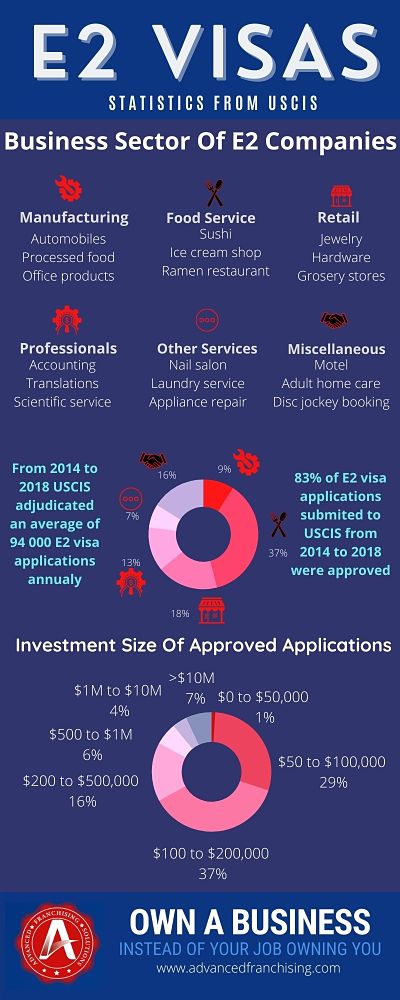When you get ready to open a business of any sort, one of the first questions you need to ask is where you’ll get the money to do it. Launching a business isn’t cheap, especially if you’re planning to start an E2 business. You need to figure out where your money will come from and make sure you can afford your business venture before you start it.
Whether you’re launching an independent business or looking to start a franchise, there are a number of financing sources available to you. Read on to discover how much money you’ll need and where it can come from if you’re applying for an E2 visa.
What Is an E2 Visa?
Before we dive into all the different funding options for an E2 visa business, let’s talk some about what an E2 visa is. This visa is designed to help investors launch new enterprises in the United States. This is a temporary visa, so in order for it to stay valid, you’ll have to run a successful business.
In particular, the E2 visa is geared towards investors who can put a “substantial amount of capital” into their new venture. There is no specific minimum you must invest, as we’ll discuss more later. The primary thing is that the government wants to see that you have the resources to ensure your business will be successful.
Basic Requirements
There are three basic requirements you must meet in order to qualify for an E2 visa. The first is that you must come from a country that maintains a treaty of trade and navigation with the United States. You can find a list of countries that maintain this visa on the U.S. Department of State’s website.
Beyond the country of origin requirement, you must also have invested or be in the process of investing a significant amount of money in your new business venture. This money must be irrevocably committed to your business even before you apply for your visa. And finally, you must be coming to the United States for the sole purpose of starting your business.

Funding Requirements
In addition to these three basic requirements, there are some specifications regarding your investment money for your E2 business. First and perhaps most obviously, your funding must come from a legitimate, legal source. You can’t fund your business by laundering money, selling drugs, engaging in the sex trade, and so on.
Your funding must also be committed to your business venture by the time you apply for your E2 visa. The government doesn’t want you to try for a visa and then be able to put that money towards other things if your visa is denied. They want to see that you’re serious about launching your business and that you’re willing to put your money where your mouth is.
How Much Is a “Substantial Amount of Capital”?
We mentioned that you have to invest a “substantial amount of capital” in order for your visa application to be approved. But how much is a substantial amount of capital, and how will you know if you have enough? The amount of capital you need to invest isn’t as much about a specific minimum amount as it is about the sort of business you’re wanting to run.
If you’re running a small, simple business that doesn’t require much expensive equipment or specialized inventory, you’ll be able to get away with a smaller up-front investment. But if you’re running a business with higher expenses and staffing needs, you’ll need more money for your investment. As a rule of thumb, E2 visa applicants should plan to have at least $100,000 to invest in their business.
How Your Funding Must Be Invested
Before you start your E2 visa application, you need to start the process of actually investing your money in your prospective business. This is due to the “at risk” rule, which states that a significant portion of your investment must be placed at risk in your business venture. This proves to the government that you’re serious about this venture and you’ll do what it takes to succeed.
You can spend your initial investment on equipment, vehicles, or materials that you’ll use in your new business. You may want to buy property for your headquarters or enter a lease agreement. You can also spend money on branding, marketing, and other such publicity efforts in advance of opening your new business.
Personal Assets
One of the simplest ways to fund your E2 business is using existing personal assets. This funding option requires that you have access to a large amount of liquid cash that you can spend on a venture like this. Keep in mind that if your visa application is denied, you’ll lose any money you invested in this venture.
Using personal assets can have a few benefits, the first of which is a simpler visa application process. You’ll likely also be better prepared to handle unexpected challenges and expenses when they arise if you have these sorts of resources. And using personal assets means you’ll see the profits from your business sooner since you won’t have to pay off business loans.

Gift Money
You may not have access on your own to the kind of money that you need to launch an E2 business. But you might have a loved one or a mentor who does and who is willing to give you the money you need. These funds are accepted as a source of business funding, though it’s a good idea to get a written contract clarifying whether the giver expects any sort of compensation in return for their generosity.
You may also decide to turn to crowdfunding as a way to finance your E2 business. This is considered another form of gift money and so is acceptable for E2 visa application purposes. Once more, however, make sure you’re keeping up with any commitments that come along with these gifts.
Personal Asset Loans
If you can’t gather the cash to start your business on your own, you may want to look into getting a loan. A bank is likely to want collateral on your loan, especially for one as large as you’ll need to start an E2 visa business. One option is to offer up some of your personal assets in order to get the loan you need to get started.
You may be able to take a mortgage out on a house you own, offer up personal property, or trade stock shares as collateral for your loan. As long as you keep making your payments, you get to keep the asset you’ve signed to the bank. But if you default on the loan, the bank gets to take possession of whatever you’ve offered up as a form of payment.
Bank Loan
If you don’t have the sort of personal assets that would work as collateral for a loan of this size, you can also opt for a straight up-and-down bank loan. These loans are pretty straightforward: the bank assesses if you’re a trustworthy borrower and decides how much money they’re willing to loan you. They’ll set an interest rate that is based on your credit history, and you’ll start making payments.
This is a tremendously popular option among business owners, and for good reason. It can be a much quicker way to raise capital than crowdfunding or trying to save the money up on your own. But keep in mind that for a while after you launch your business, a portion of any profits you get will go straight back to the bank for repayment.
Applying for Loan Pre-Approval
It can be hard to know before you apply how much money a bank will be willing to loan you. When you’re making your business plans, you need to have a reasonable idea of how much capital you’ll be able to raise. One great way to get a solid estimate is to apply for loan pre-approval with your bank.
When you apply for pre-approval, the bank looks at your income, your assets, your projected profits, and your credit history. They decide before you apply for the loan how much money they’re willing to give you. Having this number in hand can both help you in planning and can make your loan process go more smoothly.

Peer-to-Peer Lending
In the age of the internet, the world has gotten a lot smaller, and new possibilities have emerged. One of the most exciting for small business owners is the prospect of peer-to-peer lending. These loans take place largely outside the formal structures of underwriters, brokers, and credit scores.
In essence, you’ll go online and put up a request for the loan amount you need. Lenders will review your borrowing rating (a less formal version of a credit score), decide how much they’re willing to lend you, and send you some or all of the money you need. You’ll pay them a small amount of interest when you pay them back, and you can get the funds you need without the hassle of a bank.
Online Lenders
Online lenders are a step in between bank loans and peer-to-peer lending options. These lenders tend to be a little more lenient than traditional banks, but they are also more structured than peer-to-peer lenders. And more importantly, they have more capital available to loan you than many peer-to-peer lenders will.
Online lenders can be a great option if you don’t have a ton of excellent credit or personal assets to offer as collateral. They can also be convenient for people who will be operating internationally and need the wider scope of the internet. However, keep in mind that just because you can get approved for a loan doesn’t mean you can afford one, and you need to be able to pay your debts back with your business profits.
Funding With Multiple Owners
Another fantastic option for raising the capital you need without turning to loans is working with a group of investors in your E2 business. While you may not be able to swing the entire investment by yourself, you may be able to cover a large portion of it. Your co-investors can help cover the rest of the cost, keeping all of you out of the red.
The trick with E2 visa businesses is that all investors must own and/or control at least 50 percent of the business. There are some workarounds that allow a minority shareholder who runs the day-to-day affairs of the business to get an E2 visa. But if possible, plan to cover half of the investment yourself and work with a partner to cover the other half.
Estimate Your Costs
Before you start raising funds for your new business, the first thing you need to do is estimate how much money you’ll need. This will give you an idea of how much you need to liquidate from your personal assets, how much to apply for on the loan, or how much to offer to a business partnership. You want to make sure you have enough money, but you don’t want to get upside down in a loan you can’t afford.
Start by looking at the basic supplies you’ll need to run your business: equipment, office space, software, vehicles, materials, inventory, and so on. Then consider any licensing, insurance, payroll, benefits, training, and other “soft” tools you’ll need to succeed. And don’t forget marketing costs, as well as a generous emergency fund for when things don’t go according to plan.
Start a Franchise Today
Launching an E2 business is an expensive venture, and you need to be sure you have enough capital to do it. Plan on having at least $100,000 to invest, and more than that if your business is large or complex. You can get the money from several different sources, but always be sure they’re sustainable.
If you’d like to start a franchise, check out the rest of our site at Advanced Franchising Solutions. Our proven process saves you time, helps you avoid frustration, and streamlines your franchise search. Get a free franchise education today, and start owning your business instead of your job owning you.

